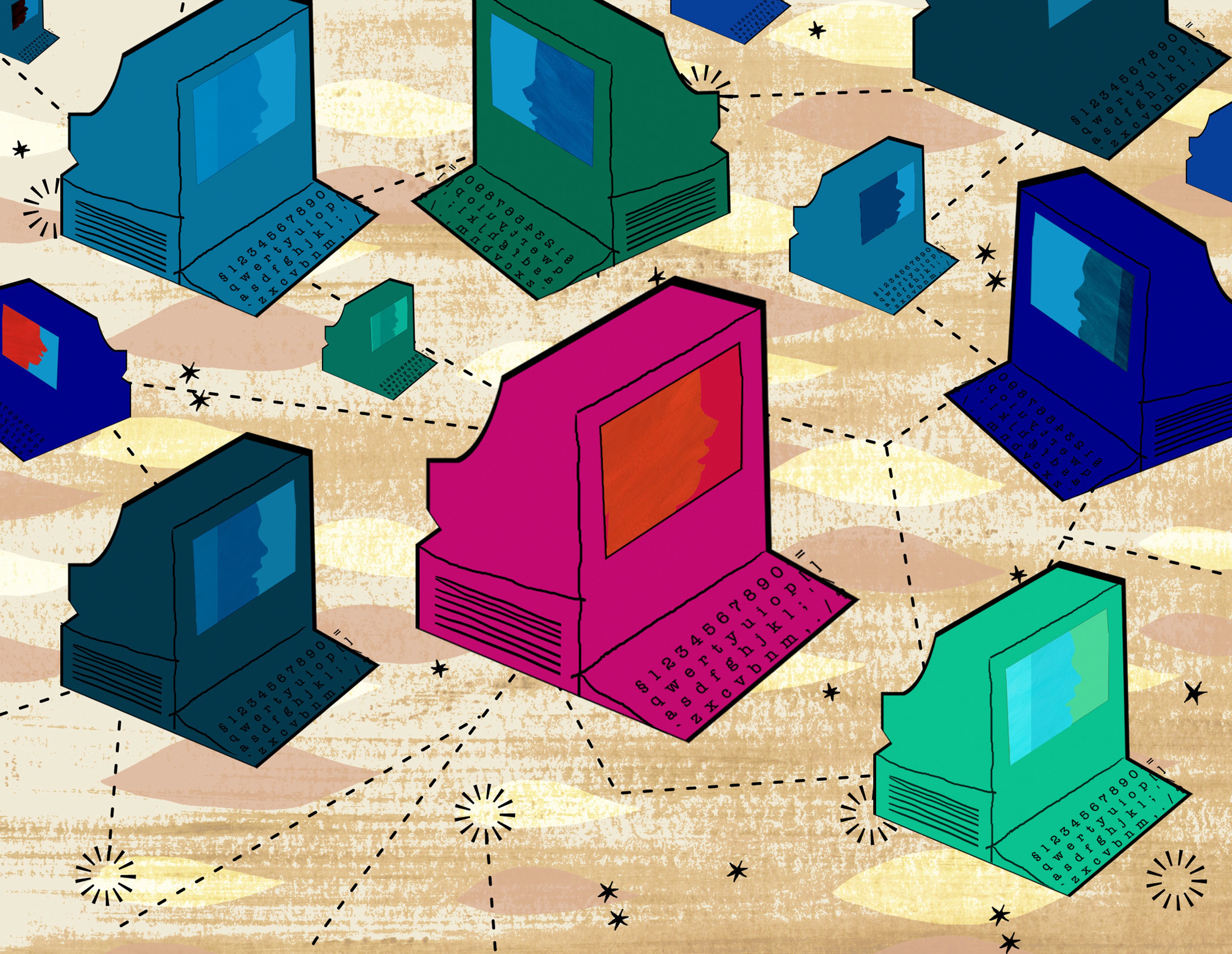Can Facebook bring internet access to the entire world?
The tech giant is trying — and it's using lasers and drones


A free daily email with the biggest news stories of the day – and the best features from TheWeek.com
You are now subscribed
Your newsletter sign-up was successful
Since 2011, the United Nations has considered internet access a basic human right. So why can so few people get online? Only 3.2 billion people, or roughly 43 percent of the world's population, can access the internet today. In the world's least developed countries, that number drops to only 9.5 percent.
Facebook wants to change that. For years, the company has called for broader web access, citing technology's ability to spark broad social and economic progress. Recently it took an important step forward in its efforts, revealing a gigantic data project that used artificial intelligence to figure out who likely has internet access — and even more significantly, who doesn't. Identifying the latter will make it easier to decide where technology is needed and how to deliver it most effectively.
The first step for researchers at Facebook's Connectivity Lab was to get a better handle on where internet access might already exist. They decided to use structures built by humans — buildings, roads, and other infrastructure — as a proxy for where people might live and get online. They got their hands on a huge population dataset from Columbia University that shows how humans are distributed around the world. Then, they trained Facebook's neural network to spot those types of structures and combine that data with available population information to figure out where people likely live.
The Week
Escape your echo chamber. Get the facts behind the news, plus analysis from multiple perspectives.

Sign up for The Week's Free Newsletters
From our morning news briefing to a weekly Good News Newsletter, get the best of The Week delivered directly to your inbox.
From our morning news briefing to a weekly Good News Newsletter, get the best of The Week delivered directly to your inbox.
Once the network knew how to find a manmade structure, it was unleashed on 350 terabytes of satellite images of 20 countries. Facebook's AI didn't just process millions of images: As Robinson Meyer reported for The Atlantic, it mapped the location of nearly two billion people in countries like Nigeria, Uganda, Ukraine, and India. All in all, Facebook analyzed 21.6 million square kilometers — over four percent of Earth's approximately 509 million square kilometers of surface.
Armed with a specific sense of where people are, Facebook envisions someday using solar-powered drones in the stratosphere to bring internet to hundreds of millions of people who lack access due to weak infrastructure, poverty, or unequal resource allocation. Each drone "will carry radio equipment to provide broadband connectivity to satellite receivers inside a roughly 50-mile radius on the ground below," Tom Simonite wrote in MIT Technology Review. "The drones will also carry equipment that can form high-speed connections using laser beams. The idea is that Facebook will create aerial chains with the drones to link several rural areas to the internet. The drone nearest an urban area would use its laser to hook into the global internet, and that connectivity would be passed down the line to drones over rural areas using the laser links."
If Facebook succeeds, it will have solved a crisis that can affect not only individuals' ability to like and share, but also their upward economic mobility. (Facebook's Free Basics service, part of a larger initiative to bring the world more internet, already is providing mobile-enabled users with websites that are accessible without data charges.) "Being left on the outside can have a profound effect," says Danica Radovanovic, a digital media specialist and internet researcher who has spent years considering the digital divide between the developed and undeveloped world.
Just how profound? Consider the impacts of internet access on the developing world. An internet connection represents access to information on everything from crop prices to maps; it offers job opportunities and a chance for educational engagement. The World Economic Forum notes that from 2004 to 2009 alone, the internet contributed at least 10 percent to the GDP growth of Brazil, China, and India — and in 2009, the World Bank found that every 10 percent increase in internet access is correlated with an economic growth increase of 1.3 percent. And that's not even to mention the transformative power of connecting with communities near and far.
A free daily email with the biggest news stories of the day – and the best features from TheWeek.com
Of course, Facebook's actions have long raised questions about whether it plans to expand internet access or simply turn Facebook into the internet. Last year, an internet researcher noticed that focus groups of Indonesians and Africans have begun confusing Facebook with the internet — and a Quartz-conducted survey found that a majority of respondents in Nigeria, Indonesia, India, and Brazil agree that "Facebook is the internet." But Facebook has competition: Google, too, is in the pilot phases of a program to get "balloon-powered internet for everyone" through its ambitious (and whimsically named) Project Loon. And many other organizations and corporations are interested in solving this problem.
No matter who manages to get more people online, warns Radovanovic, it's not enough to simply provide access. Once people get online, she says, they'll need to beef up on technical literacy and protect free speech. Perhaps internet access won't be able to bridge the digital divide after all — but Facebook's map may bring the world once step closer to finding out.
Erin Blakemore is a journalist from Boulder, Colorado. Her work has appeared in The Washington Post, Time, Smithsonian.com, mental_floss, Popular Science and more.
-
 Film reviews: ‘Send Help’ and ‘Private Life’
Film reviews: ‘Send Help’ and ‘Private Life’Feature An office doormat is stranded alone with her awful boss and a frazzled therapist turns amateur murder investigator
-
 Movies to watch in February
Movies to watch in Februarythe week recommends Time travelers, multiverse hoppers and an Iraqi parable highlight this month’s offerings during the depths of winter
-
 ICE’s facial scanning is the tip of the surveillance iceberg
ICE’s facial scanning is the tip of the surveillance icebergIN THE SPOTLIGHT Federal troops are increasingly turning to high-tech tracking tools that push the boundaries of personal privacy
-
 Israel retrieves final hostage’s body from Gaza
Israel retrieves final hostage’s body from GazaSpeed Read The 24-year-old police officer was killed during the initial Hamas attack
-
 China’s Xi targets top general in growing purge
China’s Xi targets top general in growing purgeSpeed Read Zhang Youxia is being investigated over ‘grave violations’ of the law
-
 Panama and Canada are negotiating over a crucial copper mine
Panama and Canada are negotiating over a crucial copper mineIn the Spotlight Panama is set to make a final decision on the mine this summer
-
 Why Greenland’s natural resources are nearly impossible to mine
Why Greenland’s natural resources are nearly impossible to mineThe Explainer The country’s natural landscape makes the task extremely difficult
-
 Iran cuts internet as protests escalate
Iran cuts internet as protests escalateSpeed Reada Government buildings across the country have been set on fire
-
 US nabs ‘shadow’ tanker claimed by Russia
US nabs ‘shadow’ tanker claimed by RussiaSpeed Read The ship was one of two vessels seized by the US military
-
 How Bulgaria’s government fell amid mass protests
How Bulgaria’s government fell amid mass protestsThe Explainer The country’s prime minister resigned as part of the fallout
-
 Femicide: Italy’s newest crime
Femicide: Italy’s newest crimeThe Explainer Landmark law to criminalise murder of a woman as an ‘act of hatred’ or ‘subjugation’ but critics say Italy is still deeply patriarchal
